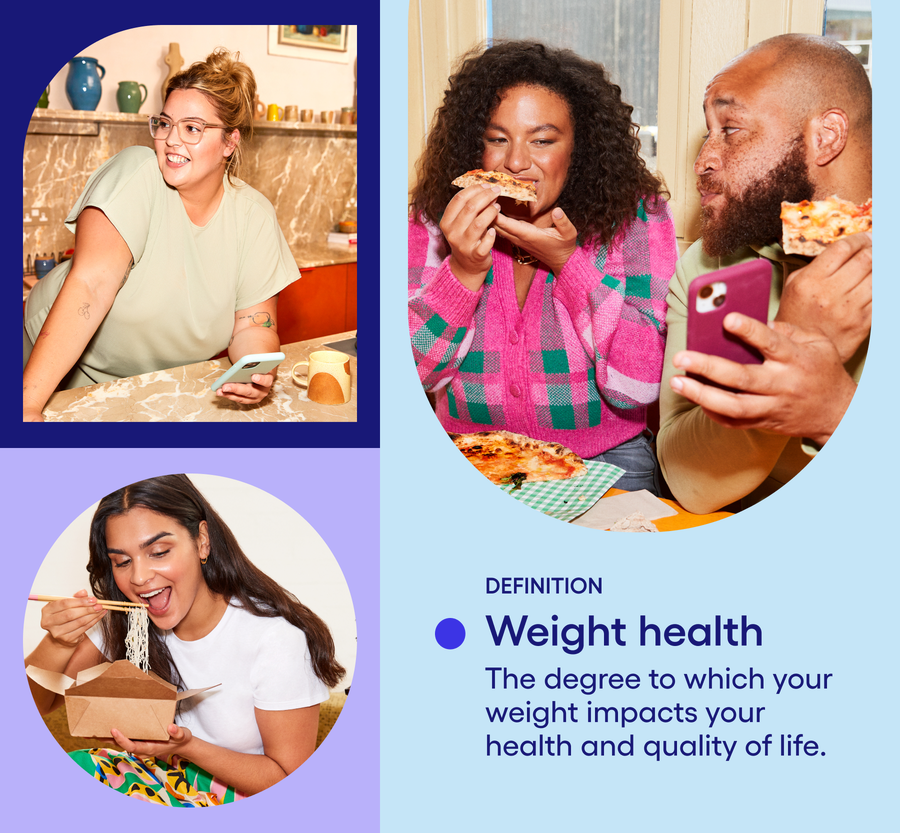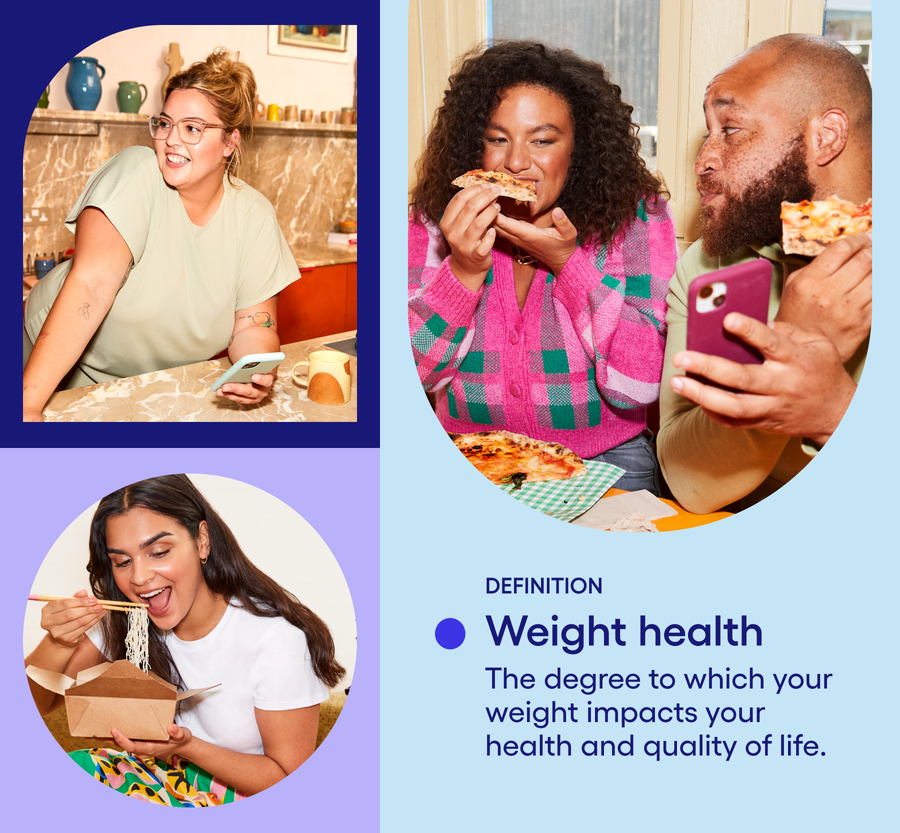Weight Health: The Key to a Balanced Lifestyle
Everyone deserves weight health
Weight and health are deeply linked—but most people are having the wrong conversation about it. It’s not about a certain size or a number on the scale. It’s about achieving true weight health. And that looks different for everyone. You won’t find weight health in the dictionary. But you will find it right here at WeightWatchers®.


“It’s no longer about the weight you lose, but about the health you gain.”
—Sima Sistani, WeightWatchers CEO
3 things to know about weight health

#1
It’s not the same as a “healthy weight.”
No one has an ideal weight based on their height. It’s just not a thing. That’s why we don’t love BMI as a measure of, well, anything. That said, it’s still used for certain things because the medical field hasn’t come up with a better metric yet.

#2
Everyone’s path can look different.
It could be weight loss, weight maintenance, or even weight gain. No matter the route, weight health is the goal.

#3
It’s still a team sport.
We talk about this with weight loss and it’s true here too. Even though your journey—and ultimate end-point—might be different, you unlock your best weight health when people have your back.

#1
It’s not the same as a “healthy weight.”
No one has an ideal weight based on their height. It’s just not a thing. That’s why we don’t love BMI as a measure of, well, anything. That said, it’s still used for certain things because the medical field hasn’t come up with a better metric yet.

#2
Everyone’s path can look different.
It could be weight loss, weight maintenance, or even weight gain. No matter the route, weight health is the goal.

#3
It’s still a team sport.
We talk about this with weight loss and it’s true here too. Even though your journey—and ultimate end-point—might be different, you unlock your best weight health when people have your back.
When you feel like your best self, you have weight health
Weight health brings the focus back to you. Your ideal weight should be one that helps you feel good, be healthy, and live well. What that could look like:
Quality of life
These are the everyday things—how you feel in social situations and around others, how you think about yourself, and what you’re physically able to do.
![]() Walking into a party with a group of new people and feeling like the main character
Walking into a party with a group of new people and feeling like the main character
![]() Being open with your doctor without worrying they’ll ignore it all and just tell you to lose weight
Being open with your doctor without worrying they’ll ignore it all and just tell you to lose weight
![]() Getting to ride the roller coaster you’ve always wanted to try
Getting to ride the roller coaster you’ve always wanted to try
![]() Enjoying a day of shopping with friends—walking to every store, trying on clothes, and not leaving early because your knees hurt
Enjoying a day of shopping with friends—walking to every store, trying on clothes, and not leaving early because your knees hurt
Health
Whether you’re aiming to prevent certain conditions, lessen symptoms, or working to reverse them entirely, improving your weight health can have an impact.
![]() Type 2 diabetes: Even modest weight loss (3–5% of your body weight) can help ease insulin resistance. Higher amounts (over 10%) can put it into remission.
Type 2 diabetes: Even modest weight loss (3–5% of your body weight) can help ease insulin resistance. Higher amounts (over 10%) can put it into remission.
![]() Heart disease: Abnormal levels of cholesterol and triglycerides in your blood can increase risk of heart attacks and strokes. Losing weight can help improve these levels.
Heart disease: Abnormal levels of cholesterol and triglycerides in your blood can increase risk of heart attacks and strokes. Losing weight can help improve these levels.
![]() Obstructive sleep apnea: Losing extra weight around your neck can help prevent disruptions in oxygen intake during sleep.
Obstructive sleep apnea: Losing extra weight around your neck can help prevent disruptions in oxygen intake during sleep.
![]() Polycystic ovarian syndrome (PCOS): Even losing just 2% of your body weight can help alleviate symptoms.
Polycystic ovarian syndrome (PCOS): Even losing just 2% of your body weight can help alleviate symptoms.
Ryan DH, Yockey SR. Weight Loss and Improvement in Comorbidity: Differences at 5%, 10%, 15%, and Over. Curr Obes Rep. 2017 Jun;6(2):187-194.
Why weight health, why now?
For decades, we’ve been about weight loss, but we’ve also been about non-scale victories and wins that go beyond a certain pants size. Now, we’re going even further to help bridge the gap between a person’s weight and their health.
There’s no one-size-fits-all number for health. It’s time for people to recognize that weight isn’t an indicator of how much you want something or how hard you try.
And with prescription medications at the forefront of the cultural conversation, much of the chatter is about the loss of weight itself and not the overall health impact.


Obesity is a chronic condition—let’s treat it that way

Obesity affects almost half of American adults, but it’s misunderstood by other people and clinicians alike. In fact, there’s no solid way of diagnosing it right now.

A host of things can contribute to obesity: psychological, sociocultural, metabolic, environmental, behavioral, genetic, hormonal, and physiological factors.

Nutrition, physical activity, and other lifestyle factors play a role in contributing to obesity, but not as large of one as many may think.

Some people have stronger biological factors that make losing weight more difficult with behavioral interventions alone.

GLP-1s have emerged as a way to address those biological roadblocks, including appetite disruption and constant, intrusive thoughts about food (a.k.a. “food noise”).

Obesity affects almost half of American adults, but it’s misunderstood by other people and clinicians alike. In fact, there’s no solid way of diagnosing it right now.

A host of things can contribute to obesity: psychological, sociocultural, metabolic, environmental, behavioral, genetic, hormonal, and physiological factors.

Nutrition, physical activity, and other lifestyle factors play a role in contributing to obesity, but not as large of one as many may think.

Some people have stronger biological factors that make losing weight more difficult with behavioral interventions alone.

GLP-1s have emerged as a way to address those biological roadblocks, including appetite disruption and constant, intrusive thoughts about food (a.k.a. “food noise”).
Curious about prescription weight-loss meds?
WeightWatchers Clinic is our new telehealth service providing access to obesity clinicians, Rx meds (if appropriate), and a nutrition plan built for people on GLP-1s.
We won't stand for weight bias
Part of our mission with weight health includes addressing how society views and discriminates against larger bodies.
Unlike other chronic conditions that are treated with medicine and empathy, people living with obesity or overweight tend to experience the opposite: They’re told that their weight means they’re not good, hardworking, or motivated enough.
It’s inhumane and unacceptable. And these biases can have real health implications: A 2018 report found that experiencing weight bias and stigma can be as harmful to a person as the effects of obesity itself.
While obesity is one factor of weight health (and it has to be part of the convo), let’s be clear, weight health isn’t just about obesity. People of all sizes or shapes can be blamed or shamed for their weight.


How our members encounter bias
To help fully understand it, we funded the largest weight stigma study in the world, with over 18,000 WeightWatchers members. Here’s what they had to say:


64%
have experienced size or shape-based teasing or discrimination from family, coworkers, friends, classmates, and doctors.*
67%
reported weight stigma from doctors specifically, which was associated with less frequent checkups and lower quality healthcare.^
Embrace your weight health
These days, you’ll see us talking more and more about weight health—because we’re focused on helping you find a healthy that makes you happy.
Learn more
- How to spot (and stop) weight bias and stigma
- How to advocate for your health
- How to make the most of your doctor’s visit
- Should you go to an obesity medicine specialist?
- We need to talk about obesity
- The truth about hormones and weight loss


